虚拟语气及倒装
语法:虚拟语气和倒装句
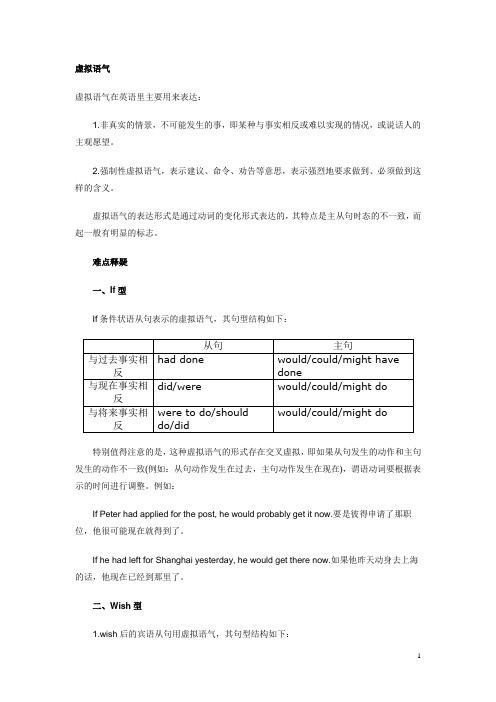
虚拟语气虚拟语气在英语里主要用来表达:1.非真实的情景,不可能发生的事,即某种与事实相反或难以实现的情况,或说话人的主观愿望。
2.强制性虚拟语气,表示建议、命令、劝告等意思,表示强烈地要求做到、必须做到这样的含义。
虚拟语气的表达形式是通过动词的变化形式表达的,其特点是主从句时态的不一致,而起一般有明显的标志。
难点释疑一、If型If条件状语从句表示的虚拟语气,其句型结构如下:特别值得注意的是,这种虚拟语气的形式存在交叉虚拟,即如果从句发生的动作和主句发生的动作不一致(例如:从句动作发生在过去,主句动作发生在现在),谓语动词要根据表示的时间进行调整。
例如:If Peter had applied for the post, he would probably get it now.要是彼得申请了那职位,他很可能现在就得到了。
If he had left for Shanghai yesterday, he would get there now.如果他昨天动身去上海的话,他现在已经到那里了。
二、Wish型1.wish后的宾语从句用虚拟语气,其句型结构如下:与过去事实相反wish that 从句的谓语动词用had done与现在事实相反wish that 从句的谓语动词用did与将来事实相反wish that 从句的谓语动词用would/could do例如:I wish they would change the menu.他们要是改变一下菜单就好了。
I wish I hadn’t spent so much money.我要是没花那么多的钱就好了。
同样地,在as if/as though引导的宾语从句中和以if only引导的带有感叹色彩的虚拟语气句子中,谓语动词与wish引导的宾语从句中的虚拟形式相同。
2.由if only 引导的虚拟语气与过去事实相反if only 谓语动词用had done与现在事实相反if only 谓语动词用did例如:If only she had asked someone’s advice! 她要是征求了别人的意见就好了!3.由as if/as though 引导的虚拟语气与过去事实相反as if/as though谓语动词用had done与现在事实相反as if/as though谓语动词用did例如:He talks about Rome as if he had been there himself.谈论起罗马来就像他去过似的。
倒装句 虚拟语气

一.全倒装(主语与谓语位置置换)1 作状语的否定副词或介词短语置于句首谓语动词不及物主语是名词(here, there ,away ,out ,down ,in the box , on the ground)2 表语或者进行时的分词部分置于句首buried in the sand was an ancient temple.Growing on the hillside are various flowers.Among the people was the young woman.二. 部分倒装(助动词系动词或情态动词置于主语前)1. 否定副词置于句首(never ,seldom,rarely,scarcely,hardly, nowhere, few,little,)2. 含有no的短语置于句首(in no way, on no condition, at no time, by no means, under no circumstances, no longer) 不包括 in no time3. Not until + 状语(包括从句)置于句首引起主句或主体倒装4. only+ 状语(包括从句)置于句首5. so /such....that 结构中 so/such 短语置于句首So cold was the weather that we had to stayat home6. So + 助/系/情+主语(neither/nor)表人云亦云7. not only.... (倒装)but also8. no sooner... than Hardly... when9. 非真是条件句省略if 从句倒装10. as/ though 非主流的部分倒装(与事实相反的假设表达对未来的美好愿望或者过去的遗憾体现说话人的态度和情绪情感是人类语言复杂含义的表达应用普遍有深意和难度和难度需要有语境和场合)一. 用时态体现的虚拟原则:对现在时间虚拟—-对过去时间虚拟—-对一般将来时间虚拟—-范围范例:1. wish +宾从2. would rather3. as if二 . 用情态动词体现的虚拟should1 . 1 坚持2 命令3 建议4 要求 +宾从(should +动词原形)2. 第一条里的动词的名词或形容词出现在句中相关的名词性从句也一样虚拟3. it is necessary/ important/ strange/ no wonder... that (should )+do4. it is(about/ high)time (that) should do 或者 did其他情态动词对现在对过去should(not)could(not)mightwould(not)needn't三 . 非真是条件句的虚拟从句(用时态)主句(用情态动词)对现在对过去对将来主从句的时间不一致()*隐形虚拟withoutbut forif onlyotherwise。
虚拟语气和倒装句讲解
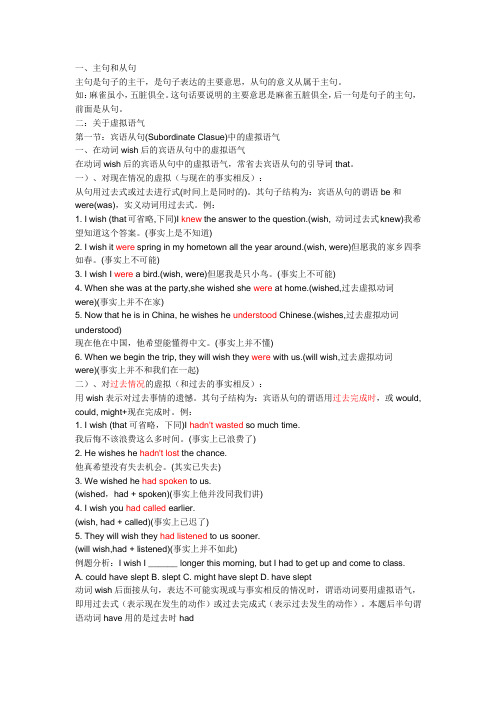
一、主句和从句主句是句子的主干,是句子表达的主要意思,从句的意义从属于主句。
如:麻雀虽小,五脏俱全。
这句话要说明的主要意思是麻雀五脏俱全,后一句是句子的主句,前面是从句。
二:关于虚拟语气第一节:宾语从句(Subordinate Clasue)中的虚拟语气一、在动词wish后的宾语从句中的虚拟语气在动词wish后的宾语从句中的虚拟语气,常省去宾语从句的引导词that。
一)、对现在情况的虚拟(与现在的事实相反):从句用过去式或过去进行式(时间上是同时的)。
其句子结构为:宾语从句的谓语be和were(was),实义动词用过去式。
例:1. I wish (that可省略,下同)I knew the answer to the question.(wish, 动词过去式knew)我希望知道这个答案。
(事实上是不知道)2. I wish it were spring in my hometown all the year around.(wish, were)但愿我的家乡四季如春。
(事实上不可能)3. I wish I were a bird.(wish, were)但愿我是只小鸟。
(事实上不可能)4. When she was at the party,she wished she were at home.(wished,过去虚拟动词were)(事实上并不在家)5. Now that he is in China, he wishes he understood Chinese.(wishes,过去虚拟动词understood)现在他在中国,他希望能懂得中文。
(事实上并不懂)6. When we begin the trip, they will wish they were with us.(will wish,过去虚拟动词were)(事实上并不和我们在一起)二)、对过去情况的虚拟(和过去的事实相反):用wish表示对过去事情的遗憾。
语法虚拟语气与倒装句使用
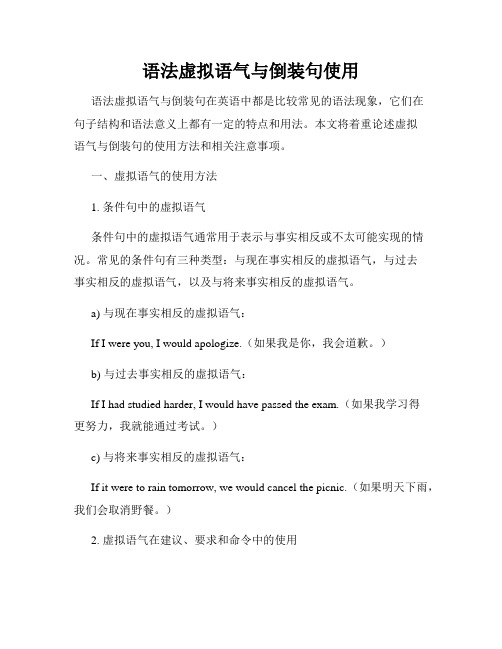
语法虚拟语气与倒装句使用语法虚拟语气与倒装句在英语中都是比较常见的语法现象,它们在句子结构和语法意义上都有一定的特点和用法。
本文将着重论述虚拟语气与倒装句的使用方法和相关注意事项。
一、虚拟语气的使用方法1. 条件句中的虚拟语气条件句中的虚拟语气通常用于表示与事实相反或不太可能实现的情况。
常见的条件句有三种类型:与现在事实相反的虚拟语气,与过去事实相反的虚拟语气,以及与将来事实相反的虚拟语气。
a) 与现在事实相反的虚拟语气:If I were you, I would apologize.(如果我是你,我会道歉。
)b) 与过去事实相反的虚拟语气:If I had studied harder, I would have passed the exam.(如果我学习得更努力,我就能通过考试。
)c) 与将来事实相反的虚拟语气:If it were to rain tomorrow, we would cancel the picnic.(如果明天下雨,我们会取消野餐。
)2. 虚拟语气在建议、要求和命令中的使用虚拟语气还可以用于表示建议、要求和命令等语气中,表示一种虚拟或非现实的情况。
常用的动词有recommend, suggest, insist等。
I suggest that he go to the doctor immediately.(我建议他立即去看医生。
)3. 虚拟语气在表达愿望和建议中的使用虚拟语气还可以用于表示愿望、希望和建议等语气中,通常使用“(should)+动词原形”来表达。
I wish I had more time to travel.(我希望有更多时间去旅行。
)二、倒装句的使用方法倒装句指的是将句子中的主语和谓语动词调换位置,主要有两种类型:完全倒装和部分倒装。
1. 完全倒装完全倒装是将整个谓语动词放在主语之前,通常在以下情况下使用:a) 表示地点、时间或方式的状语置于句首时:On the wall hung a beautiful painting.(墙上挂着一幅漂亮的画。
虚拟语气和倒装

as引导的让步状语从句要用倒装语序 n(不带冠词)/adj/ adv/ v+ as + subject + be/情 态动词
Child as he is, he knows a lot about the world. =Though he is a child, he knows a lot about
Without electricity, there would not be modern industry. 没有电,就没有现代工业。
(2)通过上下文,句中往往有 otherwise, or等词。如:
I was very busy yesterday. Otherwise I would have come to see you. 我昨天很忙,要不然我就来看你了。
the world.
单数可数名词作表语提前不用冠词
Young as he is, he knows more than you.
Hardly …when, No sooner….than,(只倒主句,主 句一般用过去完成时而从句用过去时。)
neither… nor…(两个都倒)
not only…(只倒前面)
当这些词作形容词修饰主语时且置句首时,句子不倒装。
Little work was done yesterday
Neither has he called on her, nor will he do so.
倒装
倒装的目的: 语法结构的需要:通常疑问句、there be 结构等需 要用倒装句。例如: There is a bridge across the river. 河上有座桥。 Where are you going? 你上哪去?
倒装的作用及虚拟的用法
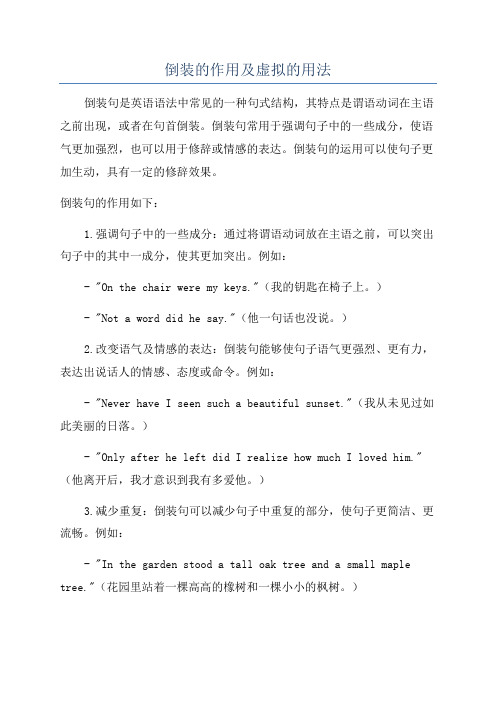
倒装的作用及虚拟的用法倒装句是英语语法中常见的一种句式结构,其特点是谓语动词在主语之前出现,或者在句首倒装。
倒装句常用于强调句子中的一些成分,使语气更加强烈,也可以用于修辞或情感的表达。
倒装句的运用可以使句子更加生动,具有一定的修辞效果。
倒装句的作用如下:1.强调句子中的一些成分:通过将谓语动词放在主语之前,可以突出句子中的其中一成分,使其更加突出。
例如:- "On the chair were my keys."(我的钥匙在椅子上。
)- "Not a word did he say."(他一句话也没说。
)2.改变语气及情感的表达:倒装句能够使句子语气更强烈、更有力,表达出说话人的情感、态度或命令。
例如:- "Never have I seen such a beautiful sunset."(我从未见过如此美丽的日落。
)- "Only after he left did I realize how much I loved him."(他离开后,我才意识到我有多爱他。
)3.减少重复:倒装句可以减少句子中重复的部分,使句子更简洁、更流畅。
例如:- "In the garden stood a tall oak tree and a small maple tree."(花园里站着一棵高高的橡树和一棵小小的枫树。
)虚拟语气是英语中一种特殊的语法形式,用来表达假设、愿望、建议、要求等不真实的情况。
虚拟语气的用法如下:1.表达假设:虚拟语气经常用于表达与事实相反的假设情况。
例如:- "If I were you, I would apologize."(如果我是你,我会道歉。
)(事实上,我并不是你。
)- "I wish I had studied harder for the exam."(我希望我当初考试时学得更努力。
虚拟语气、倒装
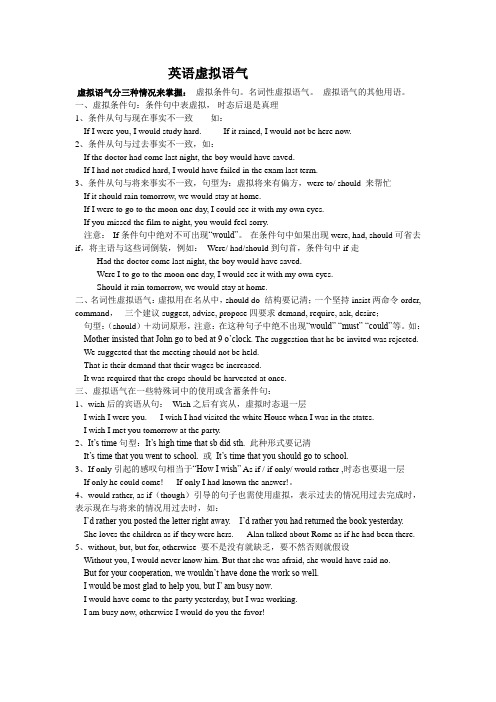
英语虚拟语气虚拟语气分三种情况来掌握:虚拟条件句。
名词性虚拟语气。
虚拟语气的其他用语。
一、虚拟条件句:条件句中表虚拟,时态后退是真理1、条件从句与现在事实不一致如:If I were you, I would study hard. If it rained, I would not be here now.2、条件从句与过去事实不一致,如:If the doctor had come last night, the boy would have saved.If I had not studied hard, I would have failed in the exam last term.3、条件从句与将来事实不一致,句型为:虚拟将来有偏方,were to/ should 来帮忙If it should rain tomorrow, we would stay at home.If I were to go to the moon one day, I could see it with my own eyes.If you missed the film to night, you would feel sorry.注意:If条件句中绝对不可出现“would”。
在条件句中如果出现were, had, should可省去if,将主语与这些词倒装,例如:Were/ had/should到句首,条件句中if走Had the doctor come last night, the boy would have saved.Were I to go to the moon one day, I would see it with my own eyes.Should it rain tomorrow, we would stay at home.二、名词性虚拟语气:虚拟用在名从中,should do 结构要记清;一个坚持insist两命令order, command,三个建议suggest, advise, propose四要求demand, require, ask, desire;句型:(should)+动词原形,注意:在这种句子中绝不出现“would”“must”“could”等。
虚拟语气、倒装句、独立主格

虚拟语气、倒装句、独立主格一.虚拟语气虚拟语气表示说话人的主观愿望、猜疑、建议或与事实不符的假设等,而不表示客观存在的事实。
虚拟语气是由句中的谓语动词的特殊形式表示出来的。
虚拟语气主要分为与现在事实相反,与过去事实相反以及与将来事实相反三个种类。
让我们一一来看下它们的结构和用法吧!1、表示与现在事实相反的情况从句:If+主语+动词一般过去时(Be动词用were)主句:主语+ should/would/might/could+do:If I were you,I would take an umbrella.如果我是你,我会带把伞。
(事实:我不可能是你)If I knew his telephone number,I would tell you.如果我知道他的电话号码,我就会告诉你。
(事实:不知道)If there were no air or water,there would be no living things on the earth.如果没有水和空气,地球上就不会有生物。
(事实:地球上既有空气也有水)If I had any money with me,I could lend you some.如果我带钱了,我就会借给你些。
(事实:没有带钱)If he studied harder,he might pass the exam.如果他再努力些,就能通过考试了。
(事实:没有努力)If I were you,I'd wear a shirt and tie.如果我是你,我就会穿衬衫和领带。
(事实:我并不是你)2、表示与过去事实相反的情况从句:If+主语+had+done主句:主语+should/would/might/could+have doneeg:If I had got there earlier,I should/would have met her.如果我早到那儿,我就会见到她。
- 1、下载文档前请自行甄别文档内容的完整性,平台不提供额外的编辑、内容补充、找答案等附加服务。
- 2、"仅部分预览"的文档,不可在线预览部分如存在完整性等问题,可反馈申请退款(可完整预览的文档不适用该条件!)。
- 3、如文档侵犯您的权益,请联系客服反馈,我们会尽快为您处理(人工客服工作时间:9:00-18:30)。
虚拟语气一、基础巩固虚拟语气基本形式1.2.3.4. It's high timethat5. 用于should类型虚拟语气的动词:建议_____________________命令_____________________要求_____________________坚持_____________________6.有时虚拟语气是通过上下文的语义表示出来的:He would have given you more help, but he was very busy.(If he had not been so busy…)He was seriously ill, otherwise he would have come to our meeting.(otherwise = If he had not been seriously ill)二、单项选择1. We demanded that we _______ of any change in the plan.A. informedB. would be informedC. be informedD. had been informed2. It’s necessary that he _______ a recognized qualification.A. hasB. haveC. hadD. having3. It's high time we ______ our attention to this problem.A. turnedB. turnC. had turnedD. would turn4. If only you __________ him what I said! Everything would have been all right.A. didn't toldB. hadn't toldC. would not tellD. would have not told5. He must have had an accident, or he_______ here then.A. would have beenB. had beenC. should havebeen D. could be6. Much labour would have been saved if the electroniccomputers_______ before.A. had inventedB. were inventedC. should have been inventedD. had been invented7. _______ cease advertising, prices would be significantly reduced.A. Were they toB. Could theyC. Ifthey D. Would they8. Five minutes earlier, and we ________ the last bus.A. had caughtB. should have caughtC. could have caughtD. caught9. You _______ the clothes! We have a washerwoman to do that sort of thing.A. shouldn't have washedB. mustn't have washedC. can not have washedD. needn't have washed10. Jean doesn't want to work right away because she thinks that if she ______ a job she probably wouldn't be able to see her friends very often.A. has to getB. were to getC. had gotD. could have got11. The mad man was put in the soft-padded cell lest he ________ himself.A. injureB. had injuredC.injured D. would injure12. It is politely requested by the hotel management that radios______ after 11 o'clock at night.A. were not playedB. not to playC. not beplayed D. did not play13. You don't have to be in such a hurry. I would rather you ______ on business first.A. would goB. will goC. wentD. have gone14. It is important that enough money ___________ to fund the project.A. be collectedB. must be collectedC. was collectedD. can be collected15. If only the committee _______ the regulations and put them into effect as soon as possible.A. approveB. will approveC. canapprove D. would approve16. I don't think it advisable that Tom ________ to the job since he has no experience.A. is assignedB. will be assignedC. beassigned D. has been assigned17. You _______ her in her office last Friday; she's been out of town for two weeks.A. needn't have seenB. must have seenC. might have seenD. can't have seen18. We didn't know his telephone number, otherwise we _______ him.A. would have telephonedB. must have telephonedC. would telephoneD. had telephoned19. It is recommended that the project ______ until all the preparations have been made.A. is not startedB. will not be startedC. not be startedD. is not to be started20. I wish I ________ longer this morning, but I had to get up and come to class.A. could have sleptB. sleptC. might have sleptD. have slept21. I ________ her to the party but I didn't know her well.A. ought have invitedB. would have invitedC. should inviteD. may have invited22. You ________ to town to see the film last week. It will be on TV tomorrow.A. needn't goB. should not goC. had better not goD. needn't have gone23. --- Would you have called her up had it been possible?---- Yes, but I ________ busy doing my homework..A. wasB. wereC. hadbeen D. would be24. It was essential that the application forms _______ back before the deadlineA. must be sentB. would be sentC. be sentD. were sent25. It is important that we ________.A. shall close the window before we leaveB. will close the window before we leaveC. must close the window before we leaveD. close the window before we leave。
